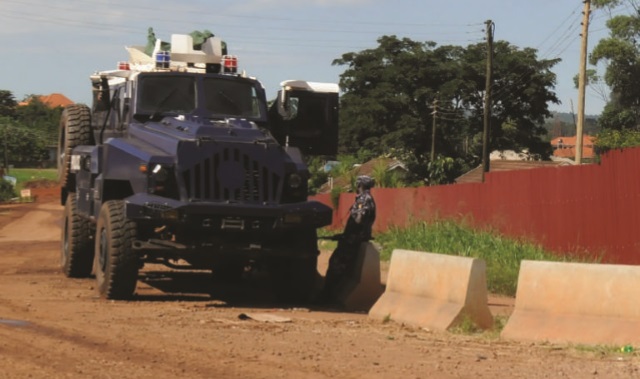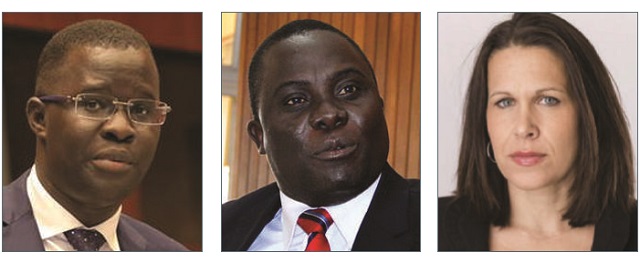
Musisi says it was during interrogation that he realised he had been arrested as a suspect in the Kaweesi murder case.
“They asked me,” he says, “Where were you on Friday 17th? Do you know Kulambiro? Do you know how to ride a bike? Do you know Kaweesi?”
He says to break him, on the third day, an officer he identified as Abbas Waswa took him to a room, threw something there and left. “Instantly,” he said, “tears were coming from my eyes and mucus from my nose endlessly.” The room was not ventilated. He could feel his lungs burning.
Musisi reveals incomprehensible demand his tormentors allegedly made. They asked him to confess that Security Minister Henry Tumukunde approached him to kill Kaweesi and Kayihura.
Apparently, when he refused, Tumukunde asked him to get assassins and he gave him the contact of Abdu Nuru in Busia and gave him Shs100 million to keep quiet.
But to get him to agree to confess these things, an officer said on the Kaweesi investigation alone, there was Shs 3 billion and he could be given Shs 1 billion of that.
“What is your account, they can first put Shs 500 million we be eating that one,” the officer, according to Musisi, said.
He says Herbert Muhangi, the commandant, police Flying Squad, also urged him to testify against that man.
In the last attempt to break him, an officer yanked his neck and dipped his head into a drum full of water.
“By the time I got out of the water,” Musisi said, “I was gasping for breath. I had no sense of life at all.”
The last officer to get him to talk was a one Minaana. “Why don’t you accept and get released,” he reportedly asked Musisi.

Entrenched impunity
Legislator Muwanga Kivumbi, a member of Parliament’s Defense and Internal Affairs Committee, was the first to raise a red flag about Nalufenya early this year but colleagues dismissed it as politicking.
“I told Ugandans but they chose to believe people like Felix Kulaigye who painted a rosy picture,” he now says.
Kulaigye, who sits on the same committee and early this year following a visit to Nalufenya, criticised Kivumbi for being alarmist and said there was no torture at Nalufenya. When contacted by The Independent recently, he declined to comment.
“Why me?” he asked, “I am not the committee chairperson. The committee has a chairperson and a Vice.”
Kivumbi said that this time, he told the chairperson of the Human Rights committee before they visited the facility on May 19, to visit the facility unannounced to prevent a situation where police cleans up and puts up a stage-managed show.
He also says Nalufenya is not the only place where torture is happening.
“Torture is happening all over the place, at Kisugu Police station, Kabalagala Police station, Kireka at SIU Headquarters, Mawanda road police station and Kololo,” Kivumbi said, “And it doesn’t require any sophistication to get this information. You can go to Luzira and talk to the suspects who have been victims of torture. This torture isn’t a one-off. It is systematic and deliberate.”
When contacted, Jovah Kamateeka, the chairperson of the Human Rights Committee of parliament, said that her committee, which visited the facility on May 19, was already compiling their report.
Nicholas Opiyo, the Executive Director of Chapter Four; a human rights organisation, says “the torture revelations confirm the high-handed behavior of this regime and it has been going on for a long time”.
“It has become the modus operandi of the para-military units that Kayihura has created in police,” he says, “I think it is going to get worse because the more Museveni feels challenged the more high-handed his government will be. This is no different from the previous regimes which he came claiming to be liberating us from. It is the same theatre but different actors.”
Maria Burnett, the Associate Director, Africa Division Human Rights Watch (HRW), said the allegations of torture at Nalufenya are part of a long and sad history of torture in various locations in Uganda over many years – from Operation Wembley at Clement Hill to Rapid Response Unit in Kireka.
“Each time allegations emerge, police leadership commits to investigate, but each time, there is no accountability and torture allegations continue,” she said, “If Uganda’s security and political leadership are serious about complying with Uganda’s own constitution and human rights law, torture will be investigated and perpetrators – regardless of rank – will face criminal charges.”
She said that HRW has in the past documented alleged cases of torture in Nalufenya over the last few years but that it is difficult to follow them, given that suspects are often held for long periods of time and then difficult to trace within prisons.
“The prison authorities have also not consistently been willing to grant us access to prisons where we might have identified people who had been tortured in Nalufenya,” she noted, “As long as the various security services operate opaquely and cover up or ignore each other’s wrongdoing, it will be very difficult to address Uganda’s torture problem.”
Torture, she noted, has consistently been present in Uganda, and the problem has been an unwillingness to investigate and prosecute those torturing suspects.
“The entrenched impunity for torture in Uganda appears to be a tacit acceptance of such abuse,” Burnet said, “Perhaps if there had been accountability – for example, for RRU abuses when General Kayihura disbanded the unit in 2011 – there would be fewer cases now.”
RELATED STORY
Police brutality cases that shocked the nation The worst known victim of torture in the Nalufenya police dungeons… https://t.co/xMCFLPINfS
— The Independent (@UGIndependent) May 29, 2017
****
 The Independent Uganda: You get the Truth we Pay the Price
The Independent Uganda: You get the Truth we Pay the Price




Senseless torture
Shocking news that torture still happens in modern times especially by government that premised itself to protect all its citizens . Human life precious- please educate the brute operatives to protect it. History is watching!
Kawaida